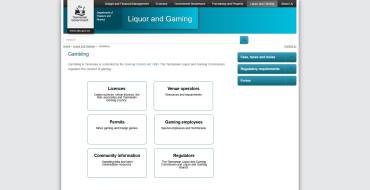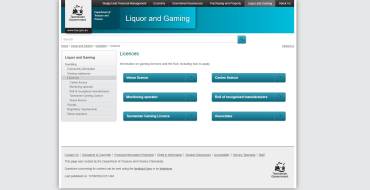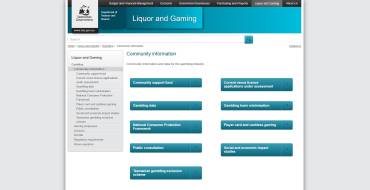
Tasmanian Liquor and Gaming Commission

As Australia is a federation, its states have the right to enact their own laws relating to the gambling industry. In addition, each state has a regulator responsible for the gambling industry in its respective jurisdiction.
State legislation must not conflict with federal legislation. For example, the Interactive Gambling Act (2001) prohibits online casinos in Australia. Accordingly, no online casino can operate legally in any state.
On the other hand, land-based casinos are legal in Australia. In the online sector, sports betting and horse racing are allowed.
The Tasmanian Liquor and Gaming Commission was established in 2015 by the merger of two organizations: The Liquor Licensing Board and the Gambling Commission. Previously, only the Gambling Commission, established in 1993 when the Gaming Control Act 1993 was passed, was responsible for regulation.
As Australia is a federation, its states have the right to enact their own laws relating to the gambling industry. In addition, each state has a regulator responsible for the gambling industry in its respective jurisdiction.
State legislation must not conflict with federal legislation. For example, the Interactive Gambling Act (2001) prohibits online casinos in Australia. Accordingly, no online casino can operate legally in any state.
On the other hand, land-based casinos are legal in Australia. In the online sector, sports betting and horse racing are allowed.
The Tasmanian Liquor and Gaming Commission was established in 2015 by the merger of two organizations: The Liquor Licensing Board and the Gambling Commission. Previously, only the Gambling Commission, established in 1993 when the Gaming Control Act 1993 was passed, was responsible for regulation.
Recommended Casinos Tasmanian Liquor and Gaming Commission
The Tasmanian Liquor and Gaming Commission has issued two general casino licenses to the following companies:
- Australian National Hotels Pty Ltd (for the Wrest Point hotel-casino);
- Tasmanian Country Club Casino Pty Ltd (for the Country Club casino).
Regulator licensed casinos
Currently, only one operator has a license to accept online betting - UBET.Tasmanian Liquor and Gaming Commission review
The Tasmanian Liquor and Gaming Commission (TLGC) is established under the Gambling Control Act 1993. It is an independent regulatory body overseeing the gaming industry.
The Commission has various regulatory responsibilities and functions, the main ones being:
- monitoring the gambling industry to ensure the integrity of the process;
- developing recommendations to the government;
- tracking gaming and betting issues and trends;
- actively participating in the development and implementation of initiatives to protect consumers and minimize harm from gambling;
- resolving complaints relating to the conduct of games or other forms of betting;
- performing other functions set out in the Gambling Act.
Before August 2015, there were two different organizations: the Liquor Licensing Board and the Gambling Commission. In 2015, these organizations merged, resulting in the founding of the Tasmanian Liquor and Gaming Commission.
Many types of gambling are permitted in Tasmania. The exception is the operation of online casinos. The ban was adopted on the basis of the federal law regulating interactive gambling.
The regulator is quite active in the social sphere. It has quite a wide functionality to help addicted citizens. Casinoz separately notes that there is an opportunity to get help not only to the player himself, but also to ask for help to friends or close relatives for whom gambling has become a problem.
The main tool is the self-exclusion register, with its help you can ban yourself from entering any gambling clubs, including online bookmakers. Psychologists and a free hotline are also available.
Gallery
License types of Tasmanian Liquor and Gaming Commission
The Tasmanian Liquor and Gaming Commission issues the following types of licenses:
- Venue license - this type of license is required to operate electronic gaming machines and/or conduct Keno in a venue.
- Monitoring operator - the Tasmanian Commission has issued a monitoring operator license to Maxgaming Tas Pty Ltd (MAX) to monitor electronic gaming machines in hotels and licensed clubs in the state.
- Tasmanian Gaming License - this type of license allows gambling activities to be conducted through telecommunication devices, including the internet. Activities covered by a Tasmanian gambling license include sports betting, simulcast gambling, betting exchange, horse racing betting and major lotteries.
- General Casino License - basic casino license that authorizes casino gambling, including table games, fully automated and semi-automated table games, Keno and electronic slot machines.
- High-roller Casino License - high-stakes casino license. This type of license operates in the same way as the basic casino license, but with significantly higher minimum bet requirements and does not allow the operation of electronic slot machines or Keno. Casinos with this license can only offer gambling to non-Tasmanian residents. No licenses of this type are currently issued.
- Roll of recognized manufacturers - license to manufacture, sell, supply slot machines and casino equipment, and to service, repair and test such devices.
- Associates - associates who have a relevant connection to the applicant or current license or permit holder. They include investors, business partners, shareholders, high-ranking employees, relatives, spouses, and persons with influence over the applicant or license holder. Permission for associated persons is required to obtain a Venue license.
The unique feature of gambling licensing in Tasmania is that, under certain conditions, the Commission can declare a game to be "exceptional" and not requiring a license. Such games (subject to conditions) include:
Tipping competitions - selecting a winner from the games of the week or season in a particular sport.
- Total contributions not to exceed $10,000;
- Participants contribute no more than $150;
- Total prize (amount of contributions) fund is distributed among the winners, with no deductions.
Raffles. The prize amount does not exceed $5,000.
Sweepstakes - betting on sports and horse racing.
- Total contributions do not exceed $10,000;
- Participants contribute no more than $110;
- Prize money is paid without any deductions.
Two-up - a traditional Australian game of flipping two coins using a special board. Must be played only on April 25.
Dispute resolution
The Tasmanian Liquor and Gambling Commission deals with disputes that arise between a players and licensed operators. But first the Commission recommends that you contact the operator directly to resolve the dispute. If the problem cannot be resolved, the regulator should be contacted for assistance. It is required to describe the problem in detail and provide additional information.
On average, complaints are considered within a month. The licensing rules provide for a 21-day response period by the licensee.
Conclusion
The Tasmanian Liquor and Gambling Commission is responsible in its tasks, at least as a licensor. The commission's handling of player complaints cannot fail to please. Although, of course, if you consider online gambling, the number of companies with this license is very small. Perhaps this is due to future changes in the industry. Let's hope that the licensing of non-residents of Australia will be as competent and allow the regulator to reach the world level.
Frequently asked Questions
The Commission oversees the gambling industry in Tasmania, makes recommendations to the government, participates in responsible gambling initiatives, handles complaints, and ensures a safe and fair environment.
The Commission is responsible for overseeing the gambling industry in Tasmania, making recommendations to the government, participating in responsible gambling initiatives, handling complaints, and ensuring a safe and fair environment.
The commission issues licenses to online bookmakers, but not online casinos, as this type of gambling is banned throughout Australia.
The commission issues licenses to online bookmakers, but not online casinos, as this type of gambling is banned throughout Australia.
The Alcohol and Gambling Commission operates within the state of Tasmania.
The Commission issues licenses for establishments, for monitoring operations, for gambling by telecommunications devices, basic licenses for casinos, and regulates equipment suppliers and persons associated with gambling establishments.
The Commission issues licenses for establishments, for monitoring operations, for gambling by telecommunications devices, basic licenses for casinos, and regulates equipment suppliers and persons associated with gambling establishments.
The Tasmanian Alcohol and Gambling Commission is responsible for resolving disputes between players and operators, but it is advisable to make a complaint to the operator before approaching the Commission. In the event that the problem is not resolved, the Commission should be contacted.
| Main info | |||
| License types | Venue licence , Monitoring operator , Tasmanian Gaming Licence , General Casino Licence , High‑roller Casino Licence , Roll of recognised manufacturers , Associates | ||
| Name | Tasmanian Liquor and Gaming Commission | ||
| Site languages | English | ||
| Website | https://www.treasury.tas.gov.au/ | ||
| 🗓️ Foundation date | 2015 | ||
| Contacts | |||
|
|||
|
|||
| Feedback form | Yes |
| 🏠 Post address | GPO Box 1374 HOBART TAS 7001 |



















